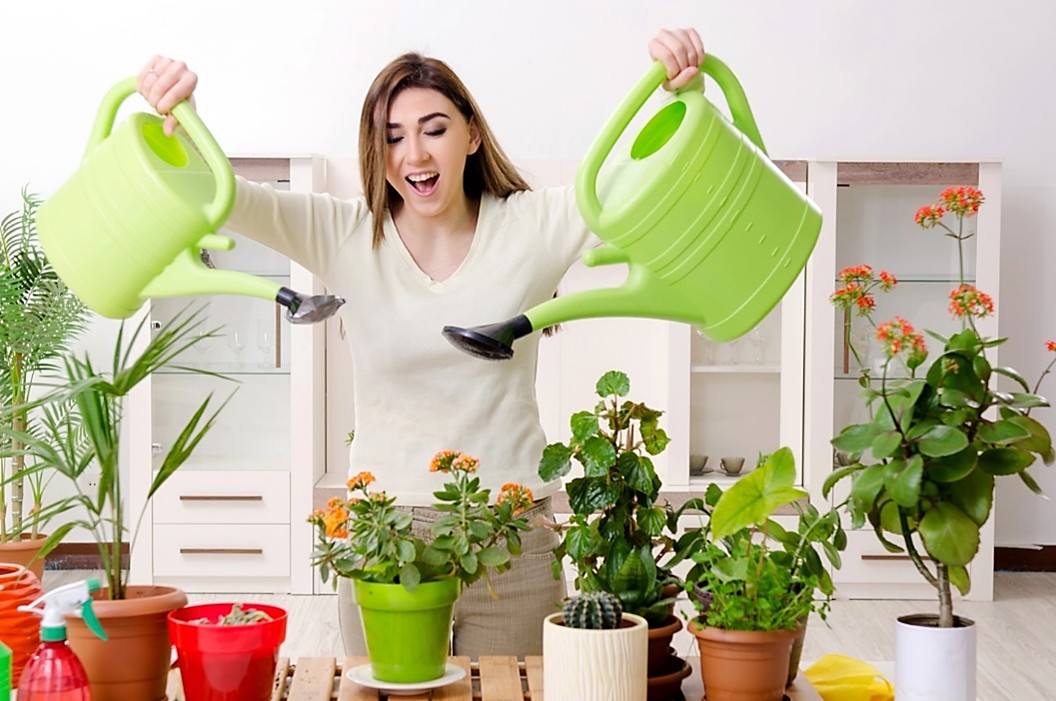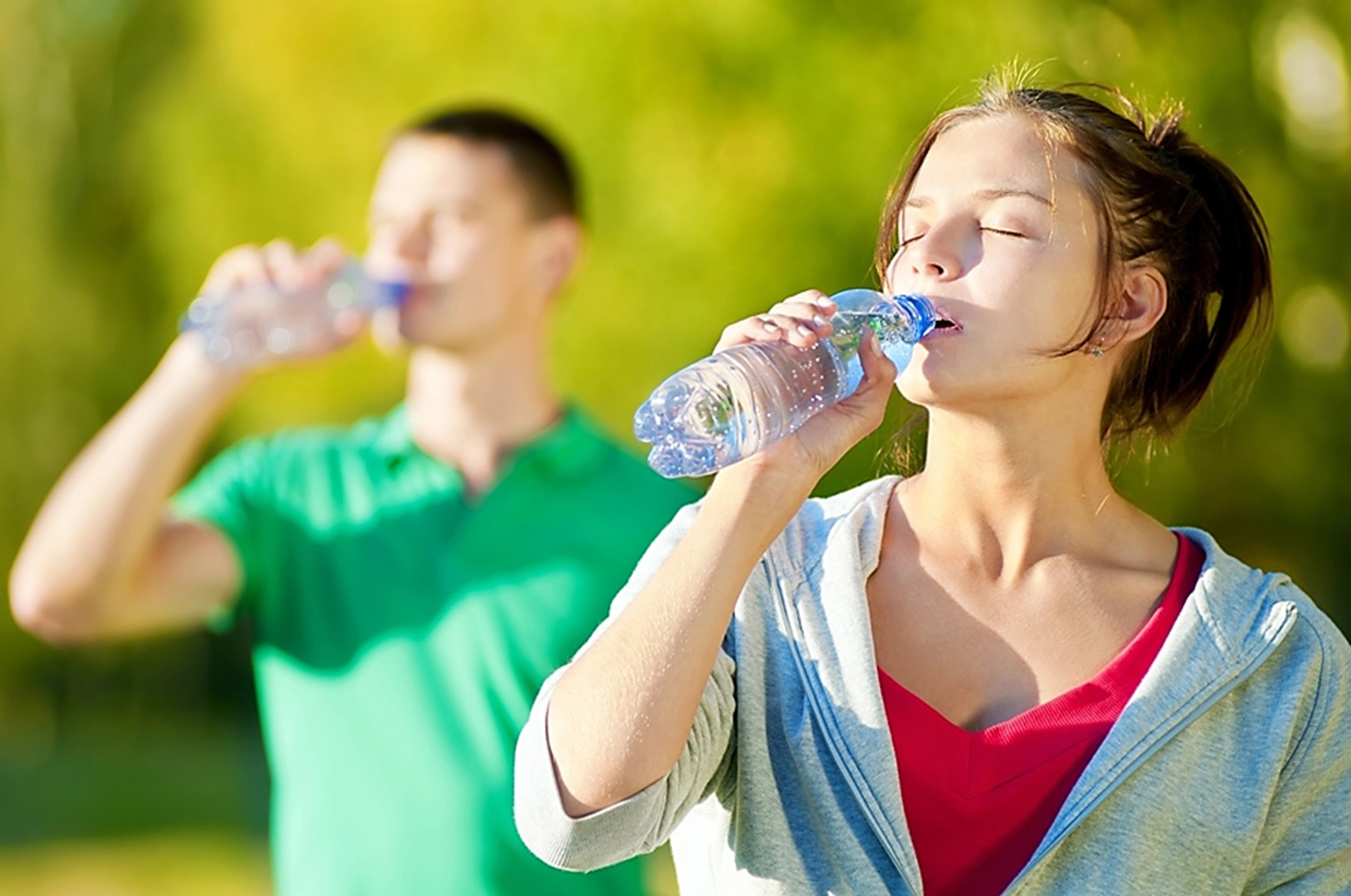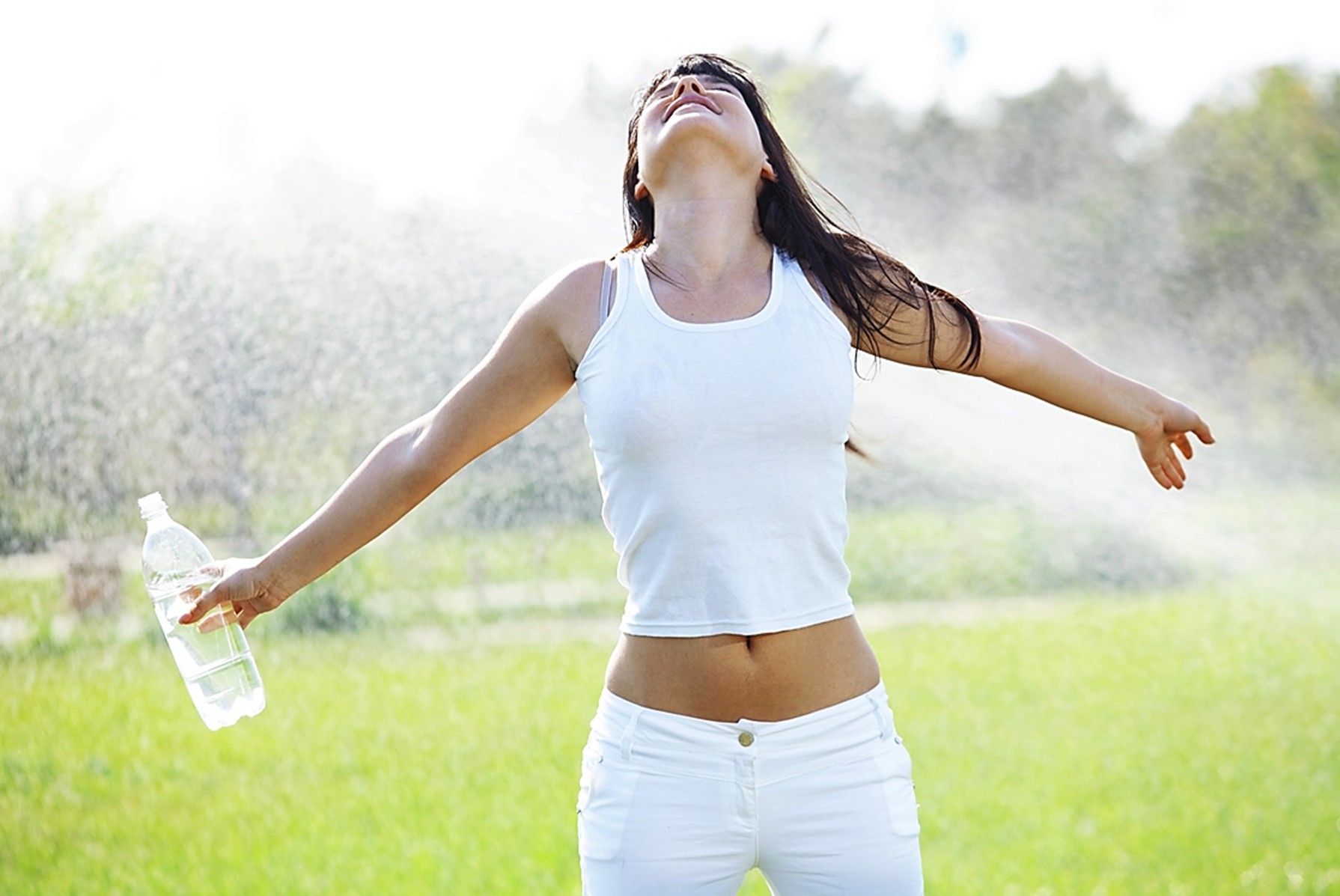
by Fern Shaw | Jul 30, 2025 | Water, water cooler
For the last few (gloriously hot and sunny) weeks, the focus has been on how to stay hydrated when it’s hot. But before everyone gets carried away filling paddling pools, pressure-washing patios and watering every leaf in sight, a stern internal voice (think Sergeant Major, broad as Stockton, moustache bristlier than Bristol) barked: “Water conservation at all costs, people!”
So now we have our hydration sorted, the focus shifts from personal hydration (still important, mind) to looking after our green spaces without soaking the planet. Here are six simple, sensible ways to keep your green spaces thriving while still being kind to water supplies:
- Raise That Mower Blade – Cutting the lawn too short in hot weather is like sunbathing without sunscreen. Set the mower to a higher level – taller grass shades the roots and helps the soil retain moisture.
- Sprinkle with Purpose – Sprinklers are best for large patches of grass. For smaller areas or container plants, a watering can (or even a humble cup) is much more precise – and far less wasteful.
- Avoid the Heat of the Day – Midday watering does more harm than good. The heat can cause water to evaporate before it even hits the roots – or worse, scorch the leaves. Early morning or evening is best.
- Inspect Sprinklers Like a Pro – Leaky valves or clogged heads? That’s water literally down the drain. A quick once-over every few days can save litres – and your lawn will thank you.
- Skip the Windy Watering – Watering on a blustery day is a bit like trying to drink from a straw in a hurricane. Most of it misses the mark. Save it for a calmer moment.
- Choose a Smarter Fountain – Fountains that trickle, or cascade lose less to evaporation than those that spray into the air. And during hotter spells, it might be best to switch them off – unless, of course, they’re affordable water fountains or essential for visiting wildlife.
And a final word from around the Water Cooler
As tempting as it may be, please don’t take a jug from the office water cooler to douse your flower beds – unless it’s for your prized bonsai that lives in the shaded corner of the conference room. (We see you, Bartholomew Bonsai from Finance.)
Because whether it’s a heatwave or just another sunny spell, conserving water is always in style – and the Sergeant Major wouldn’t have it any other way.

by Fern Shaw | Jul 15, 2025 | Water, water cooler, water dispenser
When the temperature climbs, having easy access to drinking water becomes more than just a comfort – it’s essential. While most people know hydration is key to staying healthy in the heat, there are plenty of reasons it matters that aren’t always top of mind.
Hot weather naturally increases thirst, but it’s easy to underestimate how much fluid the body needs to stay comfortable and focused. Even mild dehydration can leave people feeling sluggish, less alert, or more irritable than usual. Regular water breaks help boost energy levels, support clearer thinking, and can even improve general mood. Wherever the location, having a water dispenser on site, whether at work, the office, store, shop, gym, sports centre lobby, or job site can make a genuine difference, encouraging people to drink regularly without thinking twice.
Children, older adults and those with health conditions are particularly vulnerable in high temperatures. They might not always recognise the signs of dehydration or be able to help themselves, so it’s important that others check in and offer water often. The same goes for pets, who can’t ask for a drink and wildlife, who may struggle to find water during dry spells. Even placing a shallow bowl of water outside can be a lifeline.
Helping each other stay cool and hydrated isn’t just thoughtful – it’s vital. Making water easily available and encouraging regular sips throughout the day is a small effort that can prevent serious problems. Whether it’s through personal care or simply having a water station nearby, keeping water within reach can keep everyone – from colleagues to pets – a bit safer in the heat.

by Fern Shaw | Jul 9, 2025 | water cooler
World Chocolate Day may have just passed, but really – isn’t every day a good day for chocolate?
Chocolate, particularly dark chocolate, has more to offer than just flavour. It’s packed with antioxidants and minerals that can support various aspects of health. Here’s a quick look at some of its surprising benefits.
Heart Health
Dark chocolate contains flavanols – powerful antioxidants that help improve circulation, reduce blood pressure, and may even lower the risk of heart disease by supporting healthy cholesterol levels.
Cognitive Function
Some studies link dark chocolate to improved brain function, especially in the short term – thanks again to those antioxidants which boost blood flow to the brain.
Mood Boosting
Chocolate encourages the release of endorphins – the body’s feel-good chemicals – which can help lift mood and reduce stress.
Skin and Digestive Support
The flavanols in chocolate may also support healthy skin by improving hydration and circulation. There’s emerging research suggesting potential benefits for digestive health too.
Chocolate in Any Weather
Chocolate isn’t just a winter warmer. In the heat, it can still be part of your day – think:
Chilled chocolate milkshakes or smoothies.
Iced chocolate drinks.
Chocolate ice cream or the classic 99p flake in soft serve – never gets old and we’re never too old.
A Daily Delight?
While drinking water daily remains the top choice for hydration – irrespective of the weather – chocolate, especially the darker kind, can absolutely be part of a balanced lifestyle. Whether it’s drizzled over dessert, sipped in a smoothie, or savoured square by square, it’s a little indulgence with potential health perks.
Mind you, we’re not suggesting you become the office chocolate bringer-in-chief, tempting colleagues at the water cooler every time they top up their bottle. But a little chocolate now and then? Absolutely – here’s to chocolate: yesterday, today and every day (just don’t forget to drink your water)!

by Fern Shaw | Jun 30, 2025 | water cooler, Water Coolers
When the temperature climbs, the reminders to ‘drink more water’ seem to come from everywhere – and for good reason. Hydration is key to keeping our bodies running smoothly. But there’s more to it than just avoiding dehydration.
Here’s why staying sensibly hydrated matters – and what many people may not realise.
Hydration Helps More Than Just Thirst
We know dehydration can cause fatigue, headaches, dizziness and more. But here are a few lesser-known reasons to stay on top of your water intake:
- Joint protection: Water keeps the cartilage in your joints cushioned and functioning properly. Less water = more friction = more aches.
- Digestive support: Dehydration can slow digestion, leading to bloating and constipation.
- Body temperature regulation: Hydration helps your body cool itself – especially important during heatwaves or exercise.
But Can You Drink Too Much Water?
You can and it’s more common than people think, especially in the summer when we’re hyper-aware of the heat. Overhydration can happen when you drink excessive water without replenishing vital electrolytes like sodium and potassium.
These minerals help your body:
- Hold onto the water it needs.
- Maintain the right balance between fluids inside and outside your cells.
Without them, your body may flush too much sodium, which can lead to symptoms like nausea, confusion and headaches.
So, What’s Sensible Hydration?
- Sip steadily throughout the day, not all at once.
- Eat electrolyte-rich foods like bananas, avocados, potatoes, leafy greens and melon.
- If you sweat a lot (exercise, outdoor work, or naturally heavy perspiration), consider electrolyte supplements or drinks that contain electrolytes to help maintain fluid balance.
- Don’t force litres of water if you’re not thirsty – your body knows what it needs.
Hydration is vital, but like most things, it’s about balance, not extremes. So, when it gets hot, keep your cool, top up your water bottle as needed, be kind and remind your workmates to visit the water cooler station and drink up … but drink smart.
sources overhydration: from an article at UCLA Health

by Fern Shaw | Jun 17, 2025 | water cooler, Water Coolers
It’s heating up across the UK and while we all love a bit of sunshine, rising temperatures mean it’s more important than ever to stay properly hydrated. Whether you’re working, studying, or getting your steps in at the gym, your body needs extra water to cope with the heat.
When you’re dehydrated, your energy levels drop, your concentration wobbles and even your mood can take a hit. Not ideal when you’re trying to power through a busy day or stay sharp in a lecture or meeting. And no, that third coffee doesn’t count – in fact, it can make dehydration worse.
Why Water Coolers Just Make Sense
Having a water cooler on-site – be it in your office, gym, school, or university – makes drinking more water easier and more appealing. Constantly available chilled, refreshing water is far more tempting than a warm bottle that’s been sat in your bag all day. It’s a small change that can make a big difference to how people feel and perform throughout the day.
Water coolers also encourage a bit of movement. That quick trip for a refill? It’s a mini break that gets you away from your screen and gives your brain a breather – win-win. In places like schools and fitness centres, where staying focused or physically active is key, accessible hydration is even more important.
Cooler Vibes All Round
Let’s face it – having a dedicated spot for fresh, cool water just sends the right message. It shows you care about wellbeing, whether that’s your team’s, your clients’, or your students’. And when things are hotting up it might just be the most popular spot in the building.
So, as the mercury climbs, make sure there’s plenty of water flowing. Your body (and brain) will thank you.
Water Coolers? Where?
Looking to keep your team, students or gym-goers cool, refreshed and properly hydrated?
Contact us at AquAid Water Coolers. Wherever you’re based in the UK and whatever the size of your organisation, we’ll provide and install the perfect water dispenser to meet your hydration needs – quickly, easily and hassle-free. Stay cool, stay hydrated!

by Fern Shaw | May 27, 2025 | bottle fed water coolers, mains fed water cooler, water cooler, Water Coolers
Utilising the three C’s (more actually) and in the proverbial words of a famous English poet: Let us count the ways in which a water cooler is of benefit.
Can you have too much of a good thing? We believe it’s possible, so in order not to overwhelm you, we’re going to kickstart with five positive C catchphrases.
- Convenience
Having a water cooler in the workplace, whether it’s a small office or a sprawling industrial estate, is undeniably convenient. It ensures that fresh drinking water is always readily available, saving time and effort.
- Cost-effective
Installing a water cooler is a smart financial move. It significantly reduces the need for costly single use bottled water and other less sustainable options. Over time, this adds up to noticeable savings – good news for your budget and the planet.
- Cleanliness
Water coolers promote hygiene by providing a clean and controlled drinking water source.
This is backed by AquAid’s policy where we automatically sanitise our bottled water coolers and service our mains fed water coolers every six months by our WHA (Water Dispenser & Hydration Association) accredited engineers. It’s our way of ensuring that you enjoy not just clean water but peace of mind too.
- Consistency
There’s nothing worse than inconsistency when it comes to the basics, especially drinking water. A water cooler provides a reliable, on-demand source of both chilled and hot water, ensuring your team stays hydrated all day long, without interruption.
- Cooling
Finally, the cooling factor. A water cooler offers a refreshing source of chilled water, ideal during the warmer months, when things heat up at work, or post workout. It’s the little pick-me-up that can make a big difference to your day.
There you have it: the convenient, cost-effective, clean, consistent and cooling water cooler. Efficiently ticking all the right boxes for a healthier, hydrated workplace. Contact AquAid to explore how one could fit into your space.






